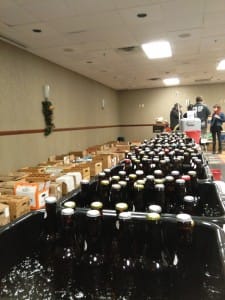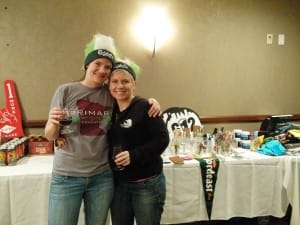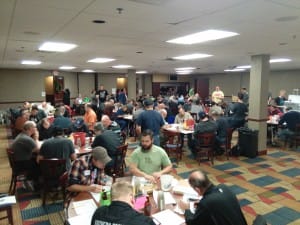That moment when your car hits a bump in the road a little too fast; when your stomach drops out and you float; unsure if you’re going to be sick or yelp with excitement. It’s that moment. Right here, right now. The roar of comingled conversations that filled the room a half-beat before, ominously simmers down to a semi-nervous din. Months of prep, thousands of travel miles, all come down to this – the awards ceremony.
One of the largest of its kind in the world. One thousand entries. Countless homebrewer hopes. And one homebrewer is about to walk away with the coveted Best In Show medal. Intoxicated by anticipation, helped along by other libations, the swirling room begins to settle. As seats turn toward the front of the room and a Superman-like burning focus tracks the man walking towards the lectern with the results in hand. With nervousness dominating the room, he announces:
“Welcome to the 2016 Upper Mississippi Mashout Homebrew Competition.”
What is it like to partake in a homebrew competition? We travel to Minnesota to find out. For fifteen years homebrewers have come together for two days at a competition they simply refer to as Mashout. As the homebrewing hobby continues to amass more conscripts, the number and size of homebrew competitions has naturally grown as well. As homebrewers become more sophisticated, the quality of the beers judged here rivals those of the best professional breweries. Of course, there are plenty of bad beers too, but that is part of the homebrewer’s journey. Nowhere else does that journey manifest itself into a physical reality more than at a competition like this.
Earlier in the evening, a circle of people hover in the far corner of the room. Eavesdrop in and you’ll hear a passionate discussion on dry-hopping techniques. And that other group of folks on the far side are discussing the effects of temperature on the flavor profiles of fermenting yeast at varying temperatures.
Conversations like this have gone virtually unchanged for years and at times seem like one long continuing discussion that only pauses after the competition ends waiting to be picked up at the exact same time next year. But one significant and important change that is clearly evident is the number of women attending events like this.
Paula Plant is a homebrewer who is here for the first time. She told us, “My first experience at the Mashout was also my first time at any homebrew competition. It was quite enlightening! I co-stewarded with an experienced person at my first table which made the job seem easy and fun.” [A steward is someone who brings beers to judging tables and organizes score sheets among other duties. ]
She continued, “Everyone seemed to know what they were doing, no chaos happening at registration or with the stewards or admins or anywhere. Things seemed to go quite smoothly. I was most impressed by the cooperation, patience, and diligence of the judges. Every beer was given a thorough write-up and full tasting review. While many were good, some beers were certainly tough to drink, yet the judges never rushed through those and endured multiple sips to provide complete feedback. Truly pleasant people and a fun experience all around!”
The types of people attracted to the homebrewing hobby are drawn from all parts of society and the world. Guillermo emigrated from Spain and joined the St Paul Homebrew Club after moving to Minnesota. He said, “I have been homebrewing for 10 years. I got into the hobby after moving to America when my girlfriend bought me a kit as a gift. The homebrewing scene in America as compared to Spain is an order of magnitude bigger. Spain is making strides, but is still far back.”
When asked what keeps him coming back each year, “The competition is sponsored to a large extent by my homebrew club so I come to support them and the event. But I learn a lot about the process behind beer judging and get to meet great people.”
The day’s events are filled with more than just rounds of beer judging. There is a silent auction and drawings for prizes many of which were donated by BSG. There is the sharing of homebrew as many of the participants bring kegs of homebrewed beer to put on tap at the community jockey box. At lunch there is a talk given by Stan Hieronymus, author of For the Love of Hops, and the evening banquet features beer pairings with rare Goose Island specialties.
But it’s more than just a beer competition and a good time. The Mashout mission includes fostering beer appreciation and education. The organizers also take proceeds from the event and donate that to a local food shelf.
Author of The Complete Guide to Making Mead, Steve Piatz is one of the founders of Mashout. Asking about the original purpose behind the competition he told us, “We wanted to make a competition for homebrewers that was really focused on doing a good job for the entrants. But I keep coming back because I like competition, I like judging and it’s a fun event we put together with an interesting program.”
As for the types of beers Steve likes to judge, “I like judging mead, cider and beer, but I like to judge the ones where the guidelines give me more information as to what they are entering. Which is why under the old guidelines as compared to the new ones just released, the ‘Spice Herb and Fruit Beers’ category was really hard to judge because there weren’t any specifics; you didn’t know what the brewer was trying to do. That makes it really hard to make an objective evaluation.”
Is it really about the beer or the people in a competition like this? “It’s both. The camaraderie, the people from all over the country. We all know each other and we love this kind of stupidity,” Steve says with a chuckle.
In Part II of this story, we’ll explore what it takes to organize an event like the Mashout.






